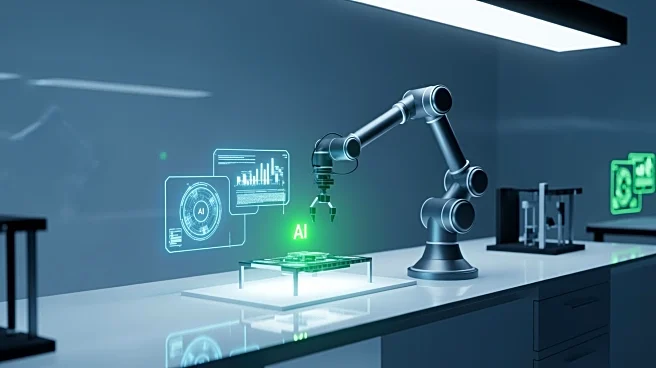What's Happening?
Telescope Innovations Corp. has announced the sale of its Self-Driving Lab (SDL) platform to the Korean Pharmaceutical and Biopharmaceutical Manufacturers Association (KPBMA). This SDL will be installed at a new R&D facility in Seoul, marking the first
deployment of such technology in Korea. The SDL automates experimental optimization using robotics, analytics, and AI, significantly accelerating drug development processes. The initiative is part of KPBMA's Convergence AI Institute for Drug Discovery, aiming to foster innovation and automation in pharmaceutical R&D. Telescope Innovations is recognized for its advanced SDL systems, which offer a closed-loop, autonomous chemical experimentation platform.
Why It's Important?
The deployment of Telescope's Self-Driving Lab in Korea represents a significant advancement in pharmaceutical research and development. By automating and optimizing experimental processes, SDLs can drastically reduce the time required to develop new drugs, potentially cutting years off traditional timelines. This technology not only enhances efficiency but also supports Korea's transition towards automated and digital R&D. The partnership between Telescope Innovations and KPBMA positions Korea as a leader in AI-driven drug development, with potential implications for global collaboration and technological exchange in the pharmaceutical industry.
What's Next?
Telescope Innovations and KPBMA are expected to build a strategic partnership for further SDL deployment and adoption in Korea's pharmaceutical sector. The installation of the SDL is scheduled to occur in the coming weeks, with the facility set to become a training hub for AI-driven experimentation. This initiative may lead to broader regional adoption of SDLs across research institutes and biopharma companies in Asia, seeking faster, data-driven development processes. The collaboration could also pave the way for future SDL deployments in other industries such as agriculture, minerals, energy, and chemicals.
Beyond the Headlines
The introduction of Self-Driving Labs in Korea could trigger long-term shifts in how pharmaceutical R&D is conducted globally. By demonstrating the effectiveness of AI-driven experimentation, this initiative may encourage other countries to adopt similar technologies, potentially leading to a more interconnected and efficient global pharmaceutical industry. Ethical considerations regarding AI's role in drug development and the potential for increased automation in scientific research may also arise, prompting discussions on the balance between human oversight and machine-driven processes.
















